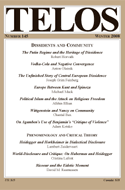In today’s episode of the Telos Press Podcast, David Pan talks with Kyle Baasch about his article “Critical Theory in the Flesh: Adorno and Foucault in San Francisco,” from Telos 196 (Fall 2021). An excerpt of the article appears here. In their conversation they discussed how Foucault’s aversion to Marxism relates to his notion of the individual as endlessly transfiguring itself through acts of creative self-invention; how Adorno interprets the freedom of the subject within the context of consumer culture and exchange society; the influence of Adorno’s experience as a heartbroken lover on his conception of happiness, particularly in Minima Moralia; how Adorno’s notion of happiness relates to the conception of harmony that Foucault criticizes; and the extent to which the two thinkers can be put into conversation. If your university has an online subscription to Telos, you can read the full article at the Telos Online website. For non-subscribers, learn how your university can begin a subscription to Telos at our library recommendation page. Print copies of Telos 196 are available for purchase in our online store.
|
“The vastness and deadly desolation of the field, the long-distance operation of steel machines, and the relay of every movement in the night drew an unyielding Titan’s mask over the proceedings. You moved toward death without seeing it; you were hit without knowing where the shot came from. Long since had the precision shooting of the trained marksman, the direct fire of guns, and with it the charm of the duel, given way to the concentrated fire of mechanized weapons. The outcome was a game of numbers: Whoever could cover a certain number of square meters with the greater mass of artillery fire, won.” “The vastness and deadly desolation of the field, the long-distance operation of steel machines, and the relay of every movement in the night drew an unyielding Titan’s mask over the proceedings. You moved toward death without seeing it; you were hit without knowing where the shot came from. Long since had the precision shooting of the trained marksman, the direct fire of guns, and with it the charm of the duel, given way to the concentrated fire of mechanized weapons. The outcome was a game of numbers: Whoever could cover a certain number of square meters with the greater mass of artillery fire, won.” |
||||
|
Telos Press Publishing · PO Box 811 · Candor, NY 13743 · Phone: 212-228-6479 Privacy Policy · Data Protection Copyright © 2024 Telos Press Publishing · All Rights Reserved |
||||
 In her exploration of Wittgenstein’s elusive and scattered commentary on community, Chantal Bax notes the absence of an explicit understanding of community in the philosopher’s work. Though Wittgenstein often invokes communal concepts, he rarely provides any details regarding the exact nature of a proper community, or the maintenance and governance a just society requires. Bax highlights the one place where Wittgenstein succumbs to the “unfortunate metaphor” of the body politic: he suggests the Jews, marginalized by European society, resemble a “‘kind of disease, anomaly,'” a “‘swelling'” which can “‘only be considered to be a proper part of the body when the whole feeling for the body is changed'” (105). Bax reads this as a tragic and empathetic lament: Wittgenstein doubts the possibility of a renewed, welcoming society that nonetheless adheres to this same vocabulary of the political body. And it is this prophetic doubt that intensifies the crisis of community that reiterates the necessity of Wittgenstein’s rethinking of life together.
In her exploration of Wittgenstein’s elusive and scattered commentary on community, Chantal Bax notes the absence of an explicit understanding of community in the philosopher’s work. Though Wittgenstein often invokes communal concepts, he rarely provides any details regarding the exact nature of a proper community, or the maintenance and governance a just society requires. Bax highlights the one place where Wittgenstein succumbs to the “unfortunate metaphor” of the body politic: he suggests the Jews, marginalized by European society, resemble a “‘kind of disease, anomaly,'” a “‘swelling'” which can “‘only be considered to be a proper part of the body when the whole feeling for the body is changed'” (105). Bax reads this as a tragic and empathetic lament: Wittgenstein doubts the possibility of a renewed, welcoming society that nonetheless adheres to this same vocabulary of the political body. And it is this prophetic doubt that intensifies the crisis of community that reiterates the necessity of Wittgenstein’s rethinking of life together. 






